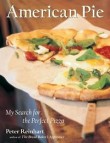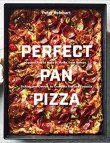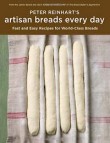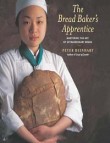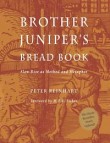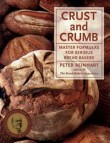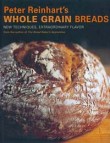Peter’s Blog, February 22nd
Hi Everyone,
We had a great demo today at Johnson & Wales University (JWU –JayWoo as we call it) by Chef Ben Roche, the Executive Pastry Chef at Moto Restaurant in Chicago. For those who don’t know about Moto, it is one of the few molecular gastronomy restaurants in the United States, featuring a 20 course tasting menu (also a 10 course version for the less adventurous) consisting of wildly imaginative small courses that add up to a big WOW of a night (3 to 4 hours are suggested to properly enjoy the meal). Chef Ben gets to create the desserts, many made with liquid nitrogen or the use of a laser or other cool tools that have been adapted for cooking. He recently obtained a Pacojet, which is one of the most beloved of the new generation of cooking toys, able to turn frozen ingredients instantly into the smoothest, best ice creams and sorbets imaginable. Needless to say, Ben has a sweet, fun, but demanding job in which he must always be thinking outside the box and continually coming up with new, mind boggling dessert concepts. For our students, he
demonstrated how to make a dessert that looks exactly like cheese and beef nachos but is actually made with chocolate “beef” and a strawberry mango salsa topped with “cheese” made from frozen orange juice shredded into liquid nitrogen. He also made a dessert soup that tasted just like donuts, as well as other wild and wacky things like cornstarch puffs that look like packing peanuts but taste like the best popcorn in the world.
This was especially fun for me because Ben was one of my students at JWU 9 years ago, so it was gratifying seeing him return to the university as a DVC (Distinguished Visiting Chef-we bring in only one such guest pastry chef each year). It’s rare for someone so young–he’s still under 30–to achieve such international acclaim as he has (he’s actually speaking at the TED Conference next week, which is about as big time as it gets!) and it is also inspiring for our current students to see someone so close to their own age find such immediate success. I’m sure many of the 300 students who watched Ben today were thinking, “Someday, that could be me.” So, that’s the upside.
Here’s the downside: very few graduates from any culinary school will ever attain such glory and success, and many will labor anonymously, albeit successfully, and even nobly, for most of their careers. As we’ve discussed many times on this website, through our lens of pizza, when it comes to greatness, many are called but few are chosen.
Here’s what I remember about Ben from when he was a young student and why I think he was able to break from the pack: he had an inquisitive mind and wasn’t afraid to take chances or even to fail–his baguettes were not always the most perfect in the class, but he used each one to examine the possibilities for how he might otherwise formulate or shape the next one. He came into the class with a love of science and he inhaled the possibilities that all of his classes offered him. In other words, he brought a lot to the work bench and later, when hard work met opportunity, he was in the right place to advance his career and his aspirations. Ben certainly isn’t the only chef to have achieved success but I think if we were to examine the roads to success of others we might discover similar characteristics: a hunger for knowledge that exceeded even their hunger for success, and an innate ability to correlate new knowledge with old knowledge which is, in actuality, the very definition of learning (at least it’s my definition).
Ben’s appearance today in front of our students reminded me that I get a lot of letters from people who want to know how I define greatness, or the difference between good and great, or who want to know the keys to success and wonder what they need to do to fulfill their dreams. Obviously, there is no one answer to questions as complex as those but there are some universals. Since our website is dedicated to the celebration of artisans and artisanship, and since we like to showcase the ones who really demonstrate and model that rare level of success, or who establish benchmarks of quality that set the standards that others follow, I think Ben’s appearance today is a timely reminder that it isn’t only practice that makes perfect (though it can certainly help–John Arena will explore that aspect on Friday in his guest column). Success, I believe, is the ability to use knowledge, both old and new, within the context of a personal vision. As easy as this sounds, there are only a rare few who operate at that level though we all aspire — or should aspire– to it. But hey, if it were easy, we would all already be doing it. More importantly, though, when you combine the ability to correlate knowledge, which is, in my opinion, the single most powerful tool for creativity in the world, with a personal vision that aspires to change the world for the better — or, as Richard Bolles, in his wonderful book, How to Find Your Mission in Life, puts it, to leave the world better than you found it — the possibility of greatness is suddenly on the table.
I’d like to think that many of you who keep coming back to PizzaQuest every week are that kind of person — or aspire to be. And, whether you are famous or anonymous, for those who do share in the aspiration to leave the world better than you found it, we honor and celebrate you all.
Recent Articles by Peter Reinhart
- Randy Clemens and Forest Farming in Uruguay — The Back to The Earth Movement is Back!
- It’s not too late to chase your dreams: “Pizza From the Heart” A New Book by Paulie and Mary Ann Gee
- Kyle Ahlgren on the Artisan Baking Center Online Classes (and a special offer)
- Multi-James Beard Nominee Cathy Whims of Portland’s Nostrana and her Brand New Book
- Pizza Quest: KID, Manhattan’s New Slice Cafe, with Chefs Ian Coogan and Max Blackman-Gentile
- Peter Scott Ruben: Why Frank Sinatra is the true “Chairman of the Board,” and the Greatest of the Greats



